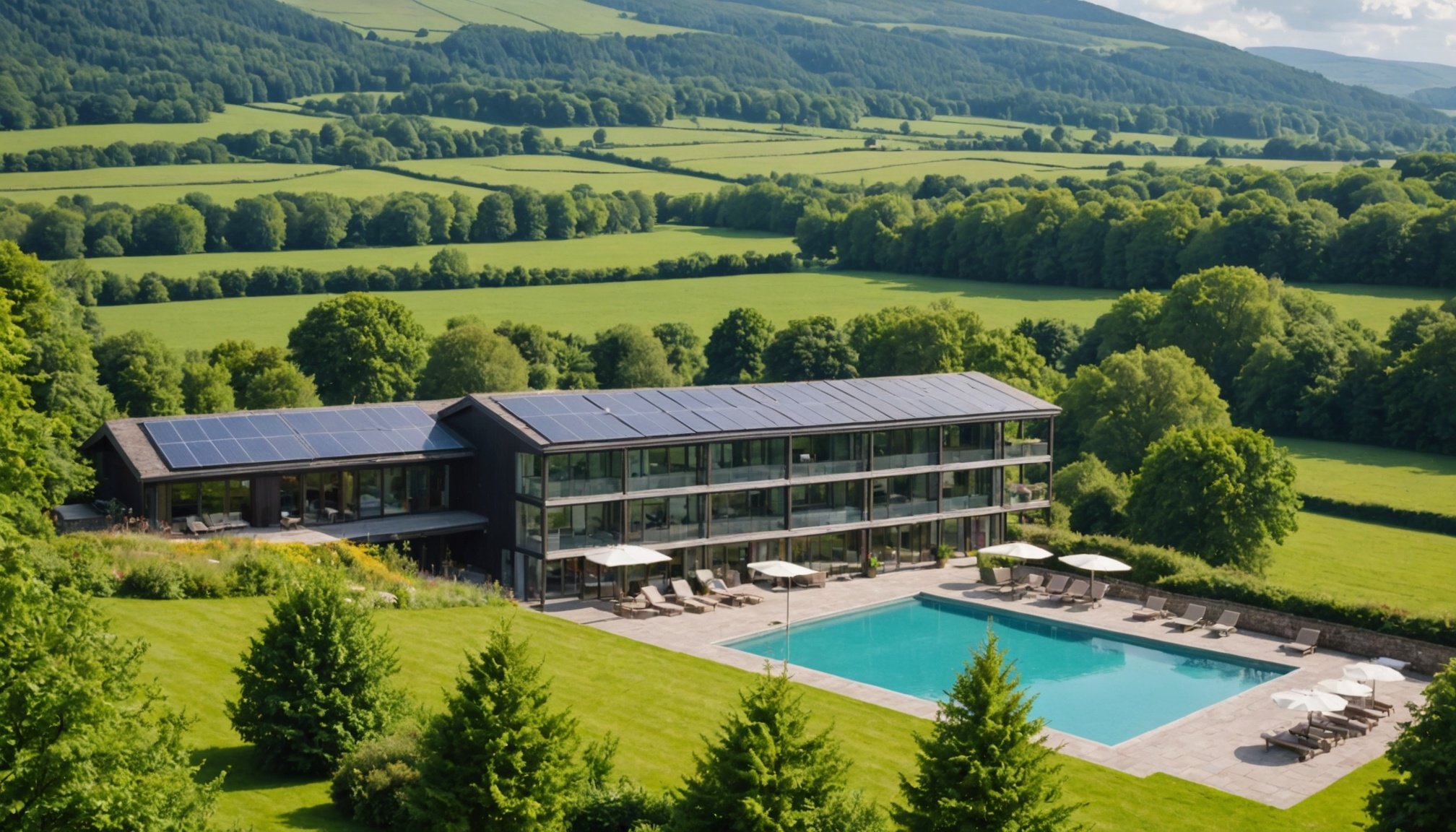Mastering UK Environmental Assessments: Your Ultimate Guide to Launching a Sustainable Hotel Project
Understanding the UK’s Environmental Assessment Process
When it comes to launching a sustainable hotel project in the UK, navigating the environmental assessment process is crucial. This process is designed to ensure that your hotel project not only complies with UK regulations but also minimizes its environmental impact.
The Stages of Environmental Assessment
The environmental assessment process in the UK involves several key stages:
Also to read : Kickstart Your UK Artisan Craft Marketplace: A Comprehensive Guide to Seller Compliance and Thriving Success
-
Screening: This initial stage determines whether an environmental assessment is necessary for your project. It’s typically mandatory for projects that could have significant environmental impacts[1].
-
Scoping: Once it’s determined that an assessment is needed, the scoping stage outlines which environmental impacts need to be examined. This stage is critical for stakeholder engagement, allowing for a comprehensive review of the potential effects of your project[1].
Also to discover : Comprehensive Guide to Launching a UK Non-Profit Dedicated to Renewable Energy Initiatives
-
Assessment: During this phase, detailed studies are conducted to analyze the potential environmental impacts of your project. Key components of this assessment include air and water quality, biodiversity conservation, and energy use. Early planning and establishing rapport with stakeholders are essential to streamline compliance and mitigate unexpected hurdles[1].
-
Environmental Impact Statement (EIS): After the assessment phase, an EIS is drafted, detailing the findings and proposing mitigation measures. Decision-makers then review the EIS to grant consent or request further adjustments. This structured approach supports sustainable development by reducing negative environmental impacts while promoting long-term benefits[1].
Key Regulations and Standards in Sustainable Hotel Development
Understanding the regulatory landscape is vital for any sustainable hotel project in the UK. Here are some of the key regulations and standards you need to be aware of:
Overview of Relevant Legislation
Several statutes guide sustainable development in the UK:
-
Environment Act 2021: This act sets targets for air quality and waste reduction, playing a pivotal role in shaping sustainable practices[1].
-
Climate Change Act 2008: This act sets long-term goals for reducing greenhouse gas emissions, which is crucial for hotels aiming to achieve net zero carbon footprint[1].
National Planning Policy Framework (NPPF)
The NPPF outlines the need for developments to contribute positively to the natural, built, and historic environment. It emphasizes sustainable development principles, ensuring that hotel projects align with broader environmental goals[1].
Local Standards and Guidelines
Local authorities implement unique standards tailored to regional needs. These guidelines focus on minimizing ecological footprints while promoting environmental and social benefits. Engaging with local councils early is crucial to align with these varied requirements[1].
Successful Case Studies in Sustainable Hotel Projects
Looking at successful case studies can provide invaluable insights for developers aiming for sustainability. Here are a few notable examples:
The Bank Hotel, Edinburgh
The Bank Hotel in Edinburgh is a remarkable example of sustainable hotel development. This historic building underwent a meticulous refurbishment to blend eco-friendly practices with heritage conservation. The hotel features energy-efficient heating systems and a rainwater harvesting setup, showcasing a commitment to sustainable operations while respecting architectural integrity[1].
The Zetter Hotel, London
The Zetter Hotel in London exemplifies innovation in new hotel builds. This hotel uses combined heat and power (CHP) systems to reduce energy consumption and features green roofs that offer insulation while enhancing biodiversity. These modern designs harmonize with nature, illustrating how sustainable practices can be integrated into new builds[1].
Practical Tips for Stakeholders in Sustainable Hotel Development
Engaging with key stakeholders and effective project management are critical components of a successful sustainable hotel project.
Stakeholder Engagement
Identifying the right stakeholders early, including local authorities, environmental groups, and community leaders, is essential. Establishing open lines of communication can streamline processes and mitigate potential conflicts. Here are some tips for effective stakeholder engagement:
- Early Communication: Engage with stakeholders from the outset to ensure their concerns are addressed.
- Transparency: Keep stakeholders informed about the project’s progress and any changes.
- Community Involvement: Encourage community participation to foster support and acceptance of the project[1].
Project Management
Effective project management involves setting clear goals, timelines, and responsibilities. Here are some key aspects to consider:
- Clear Objectives: Define sustainable practices and compliance benchmarks.
- Regular Monitoring: Track progress and identify areas for improvement.
- Resource Utilization: Engage in partnerships with local organizations and industry bodies to access industry expertise and innovative solutions[1].
Green Certifications and Their Benefits
Green certifications can significantly enhance your hotel’s sustainability credentials and operational efficiency.
Green Key Accreditation
Green Key is a global eco-label that recognizes environmental excellence in hotels, restaurants, and venues. Here’s how it can benefit your business:
- Comprehensive Framework: Provides a framework for continual environmental improvement.
- Global Recognition: Demonstrates your sustainability credentials with a globally recognized award.
- Cost Savings: Helps your business save money by improving efficiency[3].
To become Green Key certified, you need to:
- Complete an Application Form: Show how your hotel meets the 13 Green Key criteria areas.
- Receive Feedback and Complete Outstanding Actions: Address any feedback before progressing to the audit stage.
- On-Site Audit: Undergo an on-site audit to ensure compliance with Green Key criteria.
- Annual Renewal: Renew your certification annually, demonstrating evidence of continual improvement[3].
Innovative Sustainable Practices in the Hospitality Industry
The hospitality industry is evolving with innovative sustainable practices that not only reduce environmental impact but also enhance guest satisfaction.
Eco-Friendly Bedding and Toiletries
-
Eco-Friendly Bedding: Hotels are adopting bedding made from organic cotton or sustainably sourced fibers like Tencel or hemp. These materials provide superior comfort while reducing the carbon footprint associated with production and disposal[4].
-
Refillable Toiletries: Switching to refillable toiletry dispensers reduces plastic waste significantly. Hotels are choosing bulk supply options with natural ingredients packaged in stylish dispensers, encouraging usage without unnecessary waste generation[4].
Case Study: 1 Hotel Mayfair, London
The 1 Hotel Mayfair in London is a benchmark for low-impact luxury. Here’s what makes it stand out:
-
BREEAM Excellent Certification: The hotel achieved this world-leading sustainability assessment certification by utilizing 80% of its existing structure in the rebuild, avoiding significant environmental impact. The hotel features moss walls, British oak flooring, and Welsh slate in the bathrooms, blending nature with luxury[5].
-
Sustainable Design: The hotel’s design emphasizes reconstruction over new construction, with floor-to-ceiling windows bringing the outside in. The adjacent pedestrian walkway, Dover Yard, is a leafy, cobbled path accessible to all Londoners, given to the neighborhood as part of the hotel’s commitment to sustainability[5].
Repurposing Hotels for Sustainable Housing
Innovative projects are also emerging where former hotels are being repurposed into sustainable housing, addressing local housing needs while promoting sustainability.
Hotels to Homes Scheme in Torbay
The “Hotels to Homes” scheme in Torbay is a pioneering project that converts former hotels into high-quality, energy-efficient, and sustainable homes. The first scheme involves the former Brampton Court Hotel, which will be repurposed into 14 modern homes. This initiative tackles the local housing crisis and contributes to the regeneration of Torbay by redeveloping under-used brownfield sites[2].
Launching a sustainable hotel project in the UK requires a deep understanding of the environmental assessment process, compliance with key regulations, and the adoption of innovative sustainable practices. By engaging with stakeholders, managing projects effectively, and pursuing green certifications, you can ensure that your hotel not only meets environmental standards but also thrives in a competitive market.
Key Takeaways
- Compliance with Regulations: Ensure your project aligns with UK environmental laws and standards.
- Stakeholder Engagement: Engage early with local authorities, environmental groups, and community leaders.
- Innovative Practices: Adopt eco-friendly bedding, refillable toiletries, and other sustainable practices.
- Green Certifications: Pursue certifications like Green Key to demonstrate your sustainability credentials.
- Repurposing and Innovation: Consider innovative projects like repurposing hotels into sustainable housing.
By following these guidelines and examples, you can master the art of launching a sustainable hotel project that not only benefits the environment but also enhances your business reputation and operational efficiency.
Table: Comparison of Key Sustainability Certifications
| Certification | Criteria Areas | Benefits | Renewal Frequency |
|---|---|---|---|
| Green Key | 13 criteria areas including environmental management, waste management, and community engagement | Global recognition, cost savings, comprehensive framework for improvement | Annual |
| BREEAM | Assesses building performance across nine categories including energy, water, and waste | World-leading sustainability assessment, enhances building value | Varies by project |
| Local Standards | Varies by local authority | Ensures compliance with regional environmental goals, promotes local sustainability | Varies by authority |
Detailed Bullet Point List: Steps to Achieve Green Key Certification
-
Complete an Application Form: Show how your hotel meets the 13 Green Key criteria areas.
-
Include detailed information on your environmental management practices.
-
Provide evidence of your waste reduction and energy efficiency measures.
-
Outline your community engagement and social responsibility initiatives.
-
Receive Feedback and Complete Outstanding Actions: Address any feedback before progressing to the audit stage.
-
Implement any recommended changes to meet the Green Key criteria.
-
Ensure all staff are trained on the new practices and procedures.
-
On-Site Audit: Undergo an on-site audit to ensure compliance with Green Key criteria.
-
Prepare all necessary documentation and evidence for the audit.
-
Ensure that all facilities and practices are in compliance with the criteria.
-
Annual Renewal: Renew your certification annually, demonstrating evidence of continual improvement.
-
Submit updated documentation showing improvements and new initiatives.
-
Undergo periodic on-site audits to maintain certification.
Quotes from Industry Experts
-
“We are focused on finding new and innovative ways to deliver more social homes for rent to tackle the shortage of available properties. The ‘Hotels to Homes’ scheme is a key part of our strategy to address this issue,” – Cllr Alan Tyerman, Cabinet Member for Housing and Finance[2].
-
“Green Key gives you a comprehensive framework for continual environmental improvement. It demonstrates your sustainability credentials with a globally recognized award and helps your business save money by improving efficiency,” – Keep Scotland Beautiful[3].
By mastering the UK’s environmental assessment process, adhering to key regulations, and adopting innovative sustainable practices, you can ensure the success and sustainability of your hotel project, contributing positively to both the environment and the hospitality industry.






